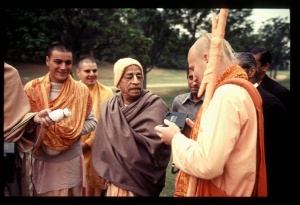SB 1.7.40: Difference between revisions
No edit summary |
(Vanibot #0054 edit - transform synonyms into clickable links, which search similar occurrences) |
||
| Line 25: | Line 25: | ||
<div class="synonyms"> | <div class="synonyms"> | ||
''sūtaḥ'' | ''[//vanipedia.org/wiki/Special:VaniSearch?s=sūtaḥ&tab=syno_o&ds=1 sūtaḥ]'' — Sūta Gosvāmī; ''[//vanipedia.org/wiki/Special:VaniSearch?s=uvāca&tab=syno_o&ds=1 uvāca]'' — said; ''[//vanipedia.org/wiki/Special:VaniSearch?s=evam&tab=syno_o&ds=1 evam]'' — this; ''[//vanipedia.org/wiki/Special:VaniSearch?s=parīkṣatā&tab=syno_o&ds=1 parīkṣatā]'' — being examined; ''[//vanipedia.org/wiki/Special:VaniSearch?s=dharmam&tab=syno_o&ds=1 dharmam]'' — in the matter of duty; ''[//vanipedia.org/wiki/Special:VaniSearch?s=pārthaḥ&tab=syno_o&ds=1 pārthaḥ]'' — Śrī Arjuna; ''[//vanipedia.org/wiki/Special:VaniSearch?s=kṛṣṇena&tab=syno_o&ds=1 kṛṣṇena]'' — by Lord Kṛṣṇa; ''[//vanipedia.org/wiki/Special:VaniSearch?s=coditaḥ&tab=syno_o&ds=1 coditaḥ]'' — being encouraged; ''[//vanipedia.org/wiki/Special:VaniSearch?s=na&tab=syno_o&ds=1 na] [//vanipedia.org/wiki/Special:VaniSearch?s=aicchat&tab=syno_o&ds=1 aicchat]'' — did not like; ''[//vanipedia.org/wiki/Special:VaniSearch?s=hantum&tab=syno_o&ds=1 hantum]'' — to kill; ''[//vanipedia.org/wiki/Special:VaniSearch?s=guru&tab=syno_o&ds=1 guru]-[//vanipedia.org/wiki/Special:VaniSearch?s=sutam&tab=syno_o&ds=1 sutam]'' — the son of his teacher; ''[//vanipedia.org/wiki/Special:VaniSearch?s=yadyapi&tab=syno_o&ds=1 yadyapi]'' — although; ''[//vanipedia.org/wiki/Special:VaniSearch?s=ātma&tab=syno_o&ds=1 ātma]-[//vanipedia.org/wiki/Special:VaniSearch?s=hanam&tab=syno_o&ds=1 hanam]'' — murderer of sons; ''[//vanipedia.org/wiki/Special:VaniSearch?s=mahān&tab=syno_o&ds=1 mahān]'' — very great. | ||
</div> | </div> | ||
Latest revision as of 18:13, 17 February 2024

A.C. Bhaktivedanta Swami Prabhupada
TEXT 40
- sūta uvāca
- evaṁ parīkṣatā dharmaṁ
- pārthaḥ kṛṣṇena coditaḥ
- naicchad dhantuṁ guru-sutaṁ
- yadyapy ātma-hanaṁ mahān
SYNONYMS
sūtaḥ — Sūta Gosvāmī; uvāca — said; evam — this; parīkṣatā — being examined; dharmam — in the matter of duty; pārthaḥ — Śrī Arjuna; kṛṣṇena — by Lord Kṛṣṇa; coditaḥ — being encouraged; na aicchat — did not like; hantum — to kill; guru-sutam — the son of his teacher; yadyapi — although; ātma-hanam — murderer of sons; mahān — very great.
TRANSLATION
Sūta Gosvāmī said: Although Kṛṣṇa, who was examining Arjuna in religion, encouraged Arjuna to kill the son of Droṇācārya, Arjuna, a great soul, did not like the idea of killing him, although Aśvatthāmā was a heinous murderer of Arjuna's family members.
PURPORT
Arjuna was a great soul undoubtedly, which is proved here also. He is encouraged herein personally by the Lord to kill the son of Droṇa, but Arjuna considers that the son of his great teacher should be spared, for he happens to be the son of Droṇācārya, even though he is an unworthy son, having done all sorts of heinous acts whimsically for no one's benefit.
Lord Śrī Kṛṣṇa encouraged Arjuna outwardly just to test Arjuna's sense of duty. It is not that Arjuna was incomplete in the sense of his duty, nor was Lord Śrī Kṛṣṇa unaware of Arjuna's sense of duty. But Lord Śrī Kṛṣṇa put to test many of His pure devotees just to magnify the sense of duty. The gopīs were put to such tests as well. Prahlāda Mahārāja also was put to such a test. All pure devotees come out successful in the respective tests by the Lord.